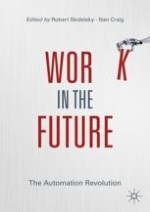2020 | OriginalPaper | Buchkapitel
11. What Computers Will Never Be Able To Do
verfasst von : Thomas Tozer
Erschienen in: Work in the Future
Aktivieren Sie unsere intelligente Suche, um passende Fachinhalte oder Patente zu finden.
Wählen Sie Textabschnitte aus um mit Künstlicher Intelligenz passenden Patente zu finden. powered by
Markieren Sie Textabschnitte, um KI-gestützt weitere passende Inhalte zu finden. powered by
